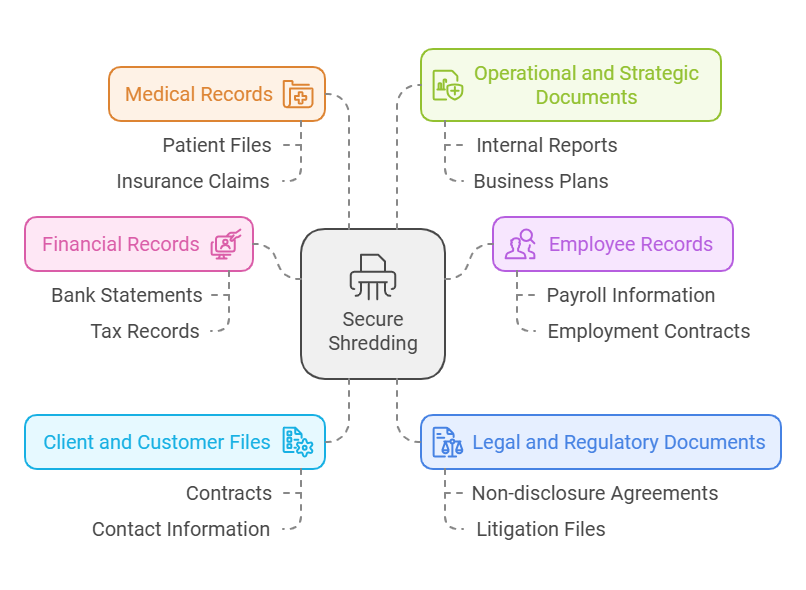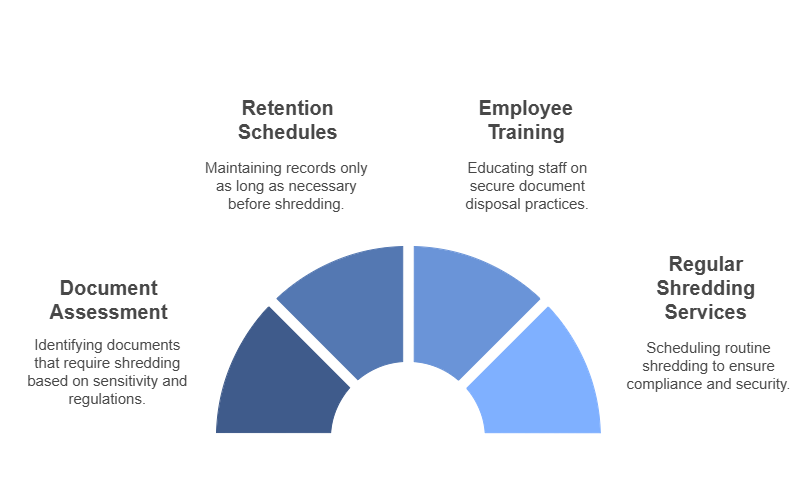Secure document destruction is essential for businesses aiming to protect sensitive information, maintain compliance, and streamline operations. FileVault’s offsite shredding is a reliable solution that ensures documents are destroyed securely while offering convenience and cost efficiency. But what types of documents are best suited for offsite shredding? Understanding this can help businesses optimize their shredding processes and maintain compliance with data protection laws.
Table of Contents

Why Offsite Shredding Is Ideal for Document Disposal
Offsite shredding offers businesses a secure, compliant, and efficient way to manage document destruction. With strict security protocols, industrial-grade shredders, and certified processes, it guarantees that sensitive information is thoroughly destroyed. For a comprehensive overview, visit What Is Offsite Document Shredding?.
Types of Documents Requiring Secure Shredding
Businesses handle a wide range of documents that contain confidential information. Below are the primary categories of documents that should always be securely destroyed through offsite shredding:
1. Financial Records
Financial documents often contain sensitive data that, if exposed, could lead to fraud, identity theft, or compliance violations. These include:
- Bank statements
- Tax records
- Budget reports
- Audit documents
- Credit card statements
Proper destruction of financial records ensures that sensitive financial information does not fall into the wrong hands.
2. Employee Records
Human Resources departments manage a wealth of employee data that must be handled with care. Documents suitable for shredding include:
- Payroll information
- Employment contracts
- Performance reviews
- Disciplinary records
- Health and benefits forms
Destroying these records after their retention period helps protect employee privacy and ensures compliance with laws like HIPAA and FACTA.
3. Client and Customer Files
Maintaining client trust is vital for businesses. Shredding outdated or unnecessary customer files prevents the misuse of personal or business-related data. Common examples include:
- Contracts
- Contact information
- Invoices
- Purchase agreements
- Confidential communications
4. Legal and Regulatory Documents
Legal records often contain sensitive or privileged information that must be destroyed when no longer needed. Examples include:
- Non-disclosure agreements
- Litigation files
- Compliance reports
- Intellectual property documents
Failing to shred these documents properly could expose businesses to significant legal risks.
5. Medical Records
Businesses in the healthcare industry or those managing employee health information must adhere to strict regulations for handling and destroying medical records. Documents requiring shredding include:
- Patient files
- Insurance claims
- Medical test results
- Prescription information
Adhering to HIPAA guidelines ensures the secure disposal of these sensitive records.
6. Operational and Strategic Documents
Businesses generate operational documents that could reveal proprietary information if improperly discarded. These include:
- Internal reports
- Business plans
- Marketing strategies
- Supplier agreements
- Meeting notes
Shredding these records prevents competitors or unauthorized individuals from gaining access to your business’s critical information.
Benefits of Shredding These Documents Offsite
Choosing offsite shredding for these document types offers several advantages:
- Enhanced Security: Documents are transported in locked containers and destroyed in secure facilities.
- Cost Efficiency: Outsourcing eliminates the need for in-house shredding equipment and labor.
- Compliance: Professional shredding services ensure adherence to data protection laws.
- Environmental Responsibility: Shredded materials are recycled, reducing waste and supporting sustainability goals.
Learn more about these benefits by visiting our Offsite Shredding Services.

Implementing a Secure Shredding Policy
To ensure all sensitive documents are securely destroyed, businesses should develop a shredding policy that includes:
- Document Assessment: Identify which types of documents require shredding based on sensitivity and regulatory requirements.
- Retention Schedules: Maintain records only as long as necessary, and shred them promptly once they’re no longer needed.
- Employee Training: Educate staff on the importance of secure document disposal and how to use shredding services effectively.
- Regular Shredding Services: Schedule routine shredding pickups to maintain compliance and security.
Partnering with FileVault for Offsite Shredding
FileVault is a trusted provider of secure offsite shredding services for businesses in Charlotte, NC. With state-of-the-art facilities, trained personnel, and a commitment to environmental sustainability, we ensure your sensitive documents are handled and destroyed with the highest level of security.
Why Choose FileVault?
- Certified Processes: We provide a Certificate of Destruction for every job, ensuring compliance.
- Customizable Services: Our solutions are tailored to meet the unique needs of your business.
- Sustainability Commitment: We recycle all shredded materials responsibly.
Explore our services and see how we can help your business at FileVault.
Take Action to Protect Your Business
Secure document destruction is an essential aspect of data protection and compliance for businesses. By identifying and shredding the right types of documents, you can mitigate risks and maintain trust with clients, employees, and partners.
Ready to streamline your document management process? Contact FileVault today to schedule your offsite shredding service. Visit our Contact Page to get started.
